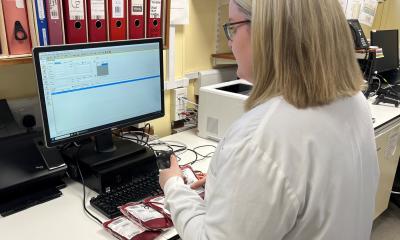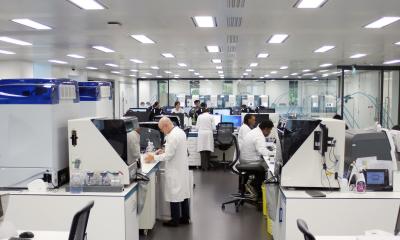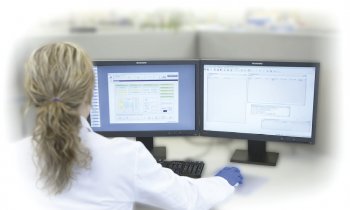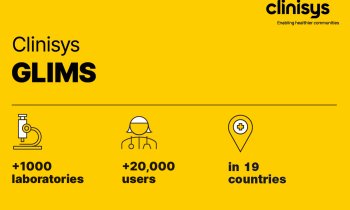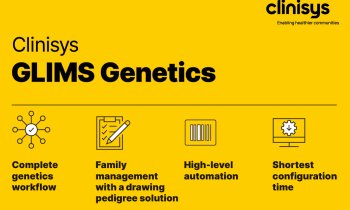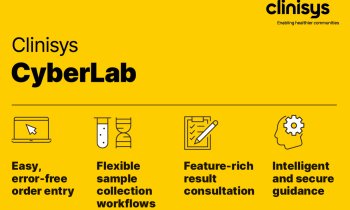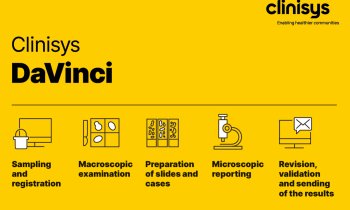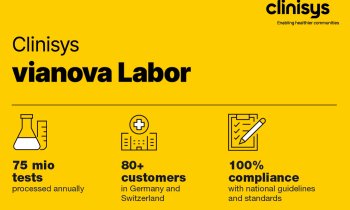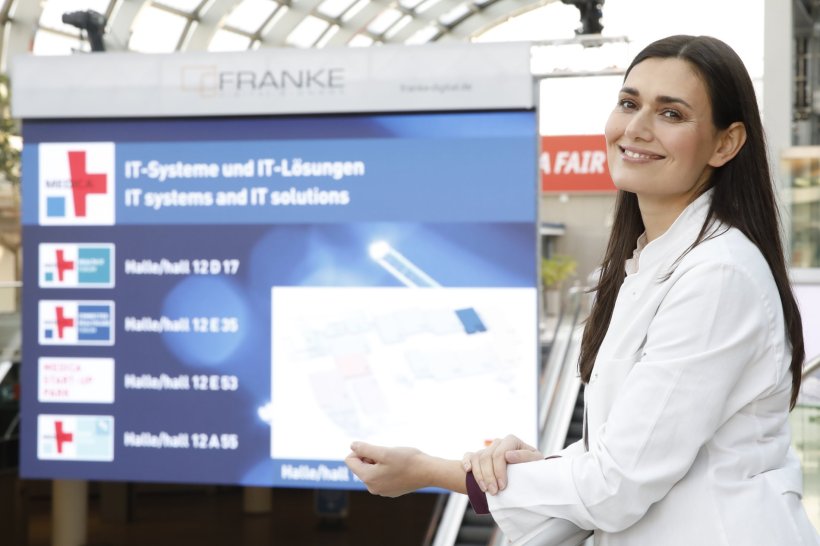
© Constanze Tillmann / Messe Düsseldorf
News • Focus on sustainability
Exploring the value of health IT in fighting climate change
At this year's Medica (Nov 14-17), the Health IT Forum offers a special focus on how health IT can contribute to more sustainability in healthcare, and on optimising treatment workflows.
Apart from the new products of the more than 4,200 participants from about 70 nations at Medica 2022, many of whom showcase health IT solutions, the Health IT Forum in Hall 12 will once more offer an overview of top trends in data-driven medicine, withy highly acclaimed speakers hosting presentations and talks. “The focus this year is especially on how health IT can contribute to more sustainability in healthcare, and on optimising treatment workflows through improved interlocking of digital processes and the human factor,” says Christian Grosser, Director Health & Medical Technologies at Messe Düsseldorf, looking forward to this year's agenda of the long established professional forum.
Recommended article
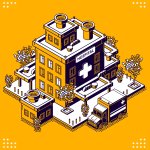
Article • Beyond economics
Coming soon: Sustainability reporting for hospitals
A company’s impact on society, economy and the environment cannot be measured in financial terms alone – and hospitals are no exception. On the contrary: the idea of measuring the quality of healthcare only in economic terms has always been fraught with problems. Hospitals as organizations have always played an important social role, and their environmental impact is increasingly recognized.
With the “Digital Patient Journey”, for example, an important topic is presented right at the start of the tradefair on Monday, 14 November, on the programme stage of the Health IT Forum. Moderator Prof. Felix Hoffmann, from the Apollon University for Health Care Management in Bremen, has already emphasised that processes in healthcare need improving. For example, a fracture of the lateral malleolus (ankle bone) usually would only need standard treatment. But if a patient arrives at the hospital late in the evening, it could happen that rather less experienced doctors have to carry out treatment, says Hoffmann. In this case, software-based check lists could render valuable support – for example those offered by Kumi Clinical. With the help of this software, clinical teams can plan, organise and synchronise treatment following a digital check list. From their arrival to check-ups in the aftermath of inpatient care, patients follow a digital treatment path, which is based on medical standards (SOPs) and can be flexibly adapted. All roles that share a part of the treatment process are integrated: doctors, care givers, service staff, hospital occupancy and discharge management, as well as medical controlling. This is to ensure that all participants are kept current at all times regarding the latest information, and the entire treatment path is followed correctly. The digital voice recognition software “voize” strives to contribute to the optimisation of these processes using digital speech assistants, and will also be represented at this forum's symposium.
Therapy plans “powered by AI”
In a further symposium on Tuesday afternoon, 15 November, there will be a discussion of therapy plans based on artificial intelligence (AI). Alfa AI, for example, uses AI to create a therapy plan. The inherent intuitive application follows patients throughout the entire process, offers transparency as well as the prescribed training plan, including video lessons. In this way, Alfa AI brings together medical knowledge, long-term experience with sports and fitness, insights about proper nutrition and state-of-the-art technology.
There are, however, misgivings concerning “check list medicine”. According to Prof. Felix Hoffmann though, these are more a matter of the proper mindset. “How do I approach treatment?”, “When is a customised form of treatment really necessary?”, and “When can treatments be standardised and carried out following previously defined paths?” are important questions in this context. Hoffmann himself is a trauma surgeon, holds a chair at the Apollon University and is head of the staff unit for medical process development at the Klinikum Darmstadt hospital complex. For him, it is a given that digitalisation alone does not improve processes. The processes themselves also need improving. As a bad example, he cites the electronic prescription, which would in theory be unnecessary if medicines could be accessed directly, without going through a pharmacy. The pharmacists, however, probably beg to differ on this.
How medical networking can help save energy
Improving processes in healthcare could also help fight climate change – for example through beneficial use of information technology. “How can Healthcare become more sustainable with digital help? ” is a question that Armin de Greiff, technical director at the university hospital in Essen, will ask during the expert panel at the Health IT Forum on Wednesday, 16 November, which is wholly dedicated to the issue of “Green Health & Sustainability”. “You cannot quite align furthering modern data-driven medicine with saving energy”, says de Greiff. However, he emphasises that using medical networking does save energy, for example by helping to avoid repeat examinations. Images and findings should not be printed, faxed, sent by post and above all not be transported by taxi. Rather, it should be possible to access them anywhere, at any time.
Armin de Greiff further describes the use of artificial intelligence (AI) for the generation of “virtual contrasts”. With appropriate training, networks are said to be able to predict different contrasts from simple data sets and thus save on time intensive examinations. AI could also help to reduce or eliminate the need for contrast agents during CT examinations. Saving on examination time while reducing radiation and contrast agents could be viewed from a sustainable perspective. On the other hand, this also means, according to de Greiff, that the persistent wish for the newest end user devices runs counter to sustainability. He goes on to explain in this context that the ever shortening product cycles serve to improve performance more than to reduce energy consumption. At the same time, he warns: “We are facing a paradigm shift.” With this, de Greiff calls attention to the fact that a higher energy consumption in data centres is not necessarily the same as overall higher consumption of energy. Virtualisation of the work place, e.g. through mobile working and by outsourcing applications with high processing demands to servers at a data centre, leads to a concentration of consumption, but not necessarily to raised levels of consumption overall.
Recommended article

Article • Energy conservation & waste reduction
Reducing the eco-footprint of radiology
Contrast agents in the wastewater and power-hungry imaging systems: The eco-footprint of healthcare is huge, and radiology departments are among the main culprits. An expert panel at the ECR Overture explored ways to make the field “greener”.
Hospitals have room to improve when protecting the climate
Hospitals then would not own a device which they would have to throw away in the end, but they would own a contract according to which the company would provide the device, which would be kept usable as a high-quality product
Anna Levsen
Dr. Anna Levsen from the Deutsches Krankenhaus Institut, the German hospital association, also strives to improve processes. Her tech talk centres on “Circularity in the Healthcare Industry” on Wednesday, 16 November at 12:00 noon. Expanding on her presentation at the forum, Levsen calls attention to the strict limitations that hospitals face in their actions for sustainability and protection of the climate. However, she insists: “There is a big lever we can use here.” Levsen, too, sees the more sustainable use of, for example, large equipment as a chance. Outdated technical equipment is rather wholly renewed than repaired and kept in the system, as a circular economy would do. One solution could be a service contract with a manufacturer for medical technology, who could maintain the device in good working order. “Hospitals then would not own a device which they would have to throw away in the end, but they would own a contract according to which the company would provide the device, which would be kept usable as a high-quality product”, Dr. Levsen describes this approach. In this approach, manufacturers of medical technology would retain control over their devices. There is also room to improve for many hospitals when it comes to food, reducing the number of surplus meals and avoiding waste. From a clinical perspective, technologies used in telemedicine within radiology for example, also offer options to reduce the need for resources. If patients must be taken care of at home while receiving telemedical treatment, they also need the appropriate devices and need training in how to use them – and this is often difficult to achieve as Dr. Levsen summarises: “A lot of things aren't thought through.” Circular economy means that all processes from beginning to end would have to be thought through, and even single-use products could offer a more sustainable solution than expected, especially where hygiene is an issue.
“We talk a lot about reducing carbon emissions, but we also have to talk about keeping resources in the system”, Dr. Levsen emphasises. For her, it is clear: “There is a need for action.” The main hindrance from the perspective of the hospital association are a lack of funds for urgently needed investments to protect the climate, which could also help to make the entire energy and resource cycle more efficient. Considering the current gas crisis, Levsen hopes that this will now set things into motion. Another challenge is to get hospital staff "on board”. As a rule of thumb, about ten percent of energy consumption can be saved by the users. Even taking the stairs instead of the lift or bringing your own coffee cup to work could help save resources.
On the final day, 17 November 2022, the forum will focus on general developments and their possible relevance with regard to health IT. Some of the topics in the programme are “Gender-sensitive medicine” and “New work & occupational health” as well as new developments in the area of artificial intelligence.
All information on the Medica Health IT Forum is available online: https://www.medica.de/mhif2.
Source: Messe Düsseldorf
13.10.2022




